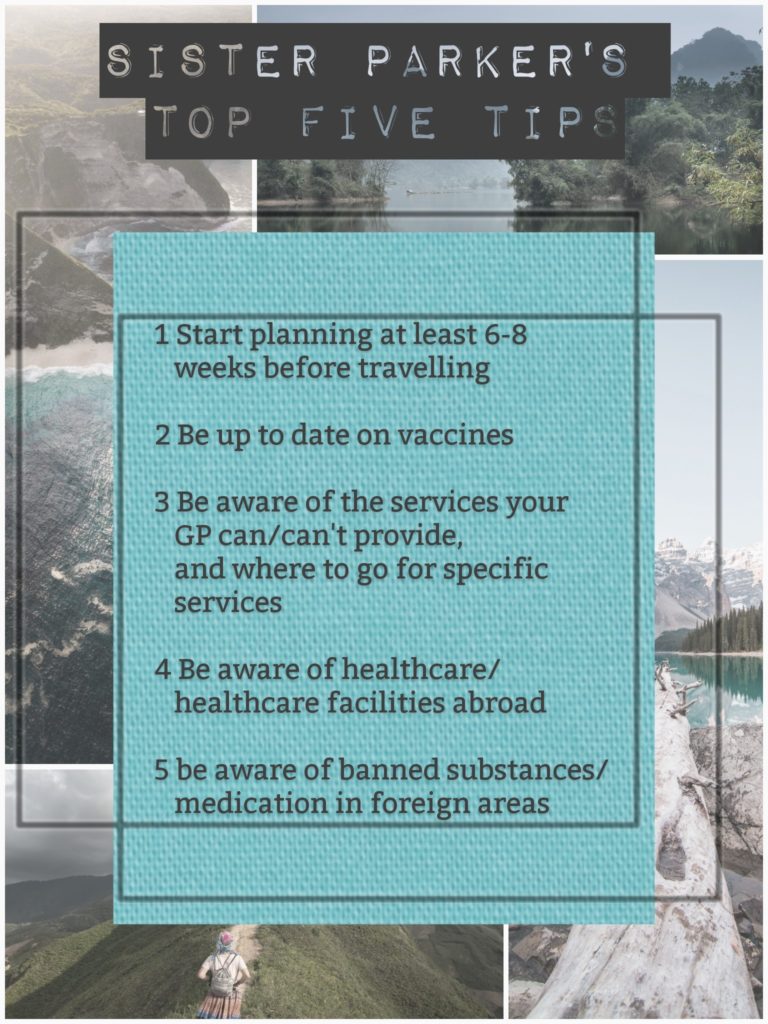Going travelling
Thinking of going travelling?
A lot of young people choose to travel abroad during the summer holidays, or during a gap year in order to explore, adventure and expand their perspectives about different cultures and countries. But before enjoying your trip, it’s important to be aware of the precautions you should take before going abroad to protect yourself from various diseases, and what resources you can use to thoroughly plan your trip.
Special thanks to Sister Anne Parker from Shay Lane GP practice for helping us with information to make this page.
Planning

- You should begin planning your trip at least 6-8 weeks before departure. This is so that you can have enough time to research the specific regions you will be travelling to see if there are any area-specific precautions that you will need to take. For example, not all areas of Argentina have a high risk for malaria, but some more rural areas may have a much higher risk, which is why it is important to specify exactly where you are travelling.
- Planning should include filling out a travel questionnaire with your GP, which uses your previous medical history and information about the country/region that you are travelling to in order to make a travel risk assessment
- This could include requiring a course of vaccinations for diseases you may be at risk from abroad that you may need to pay for, or medication such as malaria tablets. This also helps you to formulate a plan between yourself and the GP if you have a long-term condition, such as diabetes.
General Safety
- Make sure that you are aware of the country’s emergency services, local police, and the British embassy, as well as their locations and contact details.
- You should also be aware of the country’s local laws about tradition and clothing, as well as any recent political unrest and natural disasters in the area.
- Gov.uk has a page about foreign travel advice that provides the most recent updates on 226 countries and territories.
- Remember to contact family/friends frequently so that they are aware that you are safe. Also, it would be a good idea to leave with them a copy of your documents (e.g. passport, insurance, itinerary)

Insurance
- You should also consider getting good travel insurance in case of medical emergency. Insurance can also cover other things such as legal expenses and lost luggage. However, getting good travel insurance (especially for long-term trips) can save a lot of money in the case of contracting high medical bills as a result of a serious accident/infection. Insurance can cover you for any leisure/sport activities that you are likely to do and cover flights back to the UK after medical treatment and other support systems to help you in an unfortunate medical situation.
- The Foreign and Commonwealth Office has a travel insurance guidance page, which covers all of the basics about what your insurance should cover, and the different types of travel insurance you can get.
Vaccinations

- It’s important to think about what vaccinations you need before going abroad. Some vaccines may be a course of 2/3 separate injections, and so it is always important to start thinking about vaccines early on in the planning process. You will have to check if you have to pay for some vaccinations as they may not be on the NHS.
- You may have already had some travel vaccinations before, and they may still be valid. For example, the yellow fever vaccination is valid for life.
- Once you have decided which vaccinations you would like to get, you will have to contact your GP to see if they provide the vaccinations, however, if they don’t, you can contact local travel clinics, which may do the vaccinations instead.
- Some common vaccinations are listed below, but the NHS website has a page with the full overview of travel vaccines.
- Yellow Fever: Yellow fever vaccination certificates are often required to get access into many countries. These certificates can be obtained from centres after you get the vaccination. This vaccine is not available for free on the NHS and typically costs around £60-80.
- Diphtheria, Polio, and Tetanus: this vaccine is a 5 course vaccine that you normally receive between the ages of 3 and 14, make sure that you are up to date with these vaccinations.
- MMR & MenACWY: It is important to be up to date with the MMR (measles, mumps, and rubella) vaccine, due to recent measles outbreaks in Europe. Similarly the MenACWY (vaccine for meningococcal strains A, C, W, Y) can protect from four serious and deadly strains of meningococcal bacteria, which can cause meningitis and septicaemia. You can get both of these vaccinations for free with your local GP.
- Rabies: Another vaccine you may want to consider is for rabies. Rabies can be transmitted in the saliva of any warm-blooded animal that is infected. The full vaccine is a course of 3 and will incur a cost. Rabies infections can often be fatal if not treated early; therefore you might choose to get vaccinated against it. Similarly, you should also avoid animals (especially wild) when abroad, and be sure to seek immediate medical attention if an animal an animal bites you, scratches you, or licks an open wound.
First aid & emergencies

- You should pack a small first aid kit with you when travelling in case of an accident. Some of the things that may be useful are: bandages, water purification tablets, flashlight and scissors (remember not to put this in your hand luggage at airports!).
- Similarly, familiarising yourself with some emergency first aid procedures could come in handy especially if your travels involve sparsely populated areas. The Youthwatch Trafford website has an emergency first aid page specifically to help you know these skills if they are ever needed.
- Remember to know some sources of local medical help! For example, emergency services, hospitals and the local police force may be able to help.
Sexual health and Sexually transmitted illnesses (STIs)
- It is important to think about sexual health while abroad. It would be a good idea to bring condoms and emergency contraception with you, in case there are problems with the accessibility/quality of contraception in other countries.
- Zika virus, Hepatitis B, and HIV as well as may other STI’s can be caught as a result of unprotected sex or coming into contact with unclean needles, such as those used during piercings, tattoos, drugs, and blood transfusions.
- Zika virus cases are not very prominent in the UK as the mosquitos that carry the disease are not found here; however, it is more common in areas such as South America, South Asia, and some parts of Africa. This disease can be especially dangerous for pregnant women as it may cause birth defects.
- If you do have sex while away or come into contact with needles, when you arrive back into the UK, it may be worthwhile visiting a sexual health clinic. They can test for any STI’s and help with treatment. Remember that some STI’s don’t show any symptoms, and if left treated, can lead to more severe health problems.

Foreign policies
- Yellow Fever: Certain countries may require you to have a yellow fever certificate, which proves that you have been vaccinated against yellow fever, in order to be allowed entry to the country.
- Is your medication allowed abroad? Some countries may not allow certain drugs or may have a maximum quantity that you are allowed in. This may vary from country to country. Similarly, if your medication is a ‘controlled drug’ (drugs which have extra legal controls), you may need a license to take them abroad. The NHS website has a page about travelling with medicines, and can redirect you towards foreign embassies and provide more information about travelling with controlled medicine.
Prevention
- Mosquito Bites:
- Along with medications and vaccinations; you can also take precaution by trying to avoid mosquito bites. Mosquitos are known to carry diseases such as Malaria, Dengue fever, and Zika virus.
- The European Centre for Disease Prevention and Control have a page with fact-sheets about Mosquito-borne diseases which can provide more information about prevention and maps showing where these diseases are more prevalent.
- You can use mosquito nets, insect repellent, and fully covering clothing to prevent mosquito bites. However, be sure to stay away from myths and homeopathic remedies regarding insect repellent in case they are not effective. Gov.uk has published a leaflet with more detailed tips on mosquito bite avoidance and has specific information about repellents, nets, and clothing.
- Travellers’ Diarrhoea:
- This is characterised by loose stools, cramps, stomach pain and vomiting. This is usually a result of eating contaminated food or drinking contaminated water. The main risk of the illness is dehydration because you tend to lose a lot of fluids and essential ions from your body. To reduce your risk of coming into contact with travellers’ diarrhoea, be careful with what you eat or drink. Unless you’re sure that the water is safe and clean, boil the water, use water sterilising tablets, or use bottled water. This goes for brushing your teeth as well as for drinking and cooking.
- For food, you should generally avoid food from street vendors and food that is raw such as salads and fruits that you can’t peel yourself.
- The Mayo Clinic has a page about travellers’ diarrhoea that contains more information about its prevention and symptoms.
- If you find that you are particularly susceptible to diarrhoea when travelling, it may be a good idea to pack some oral rehydration treatments with you. Oral rehydration treatments contain essential salts and minerals that help your body recover from dehydration. You can find these treatments over-the-counter at pharmacies.
We hope our information is helpful to you – let us know if there’s anything else you come across in your travels which would be useful for us to include. Have a great trip!
Where Can You Get Help?
- TravelHealthPro.org – This website allows you to view country-specific information about the latest news in terms of vaccine recommendations, health risks, and factsheets about special risk travellers and infectious diseases.
Telephone: +44 (0)845 602 6712 (local call rate)
[Opening hours will be as follows: Monday, Tuesday, Thursday and Friday 13:00 – 15:00; Wednesday only 13:30 – 15:30]
travelhealthpro.org.uk/countries
- Gov.UK Foreign Travel Advice – The government provides updated information about advice to foreign areas, including advice about local laws, entry requirements, safety and security, and natural disasters.
www.gov.uk/foreign-travel-advice - NHS: Guides to Healthcare in Other Countries – This website contains guides to healthcare in other countries inside and outside the European Economic Area (EEA).
www.nhs.uk/using-the-nhs/healthcare-abroad/healthcare-when-travelling-abroad/
Urgent Help
If you are on holiday and are in a crisis call 112 and it will take you to the local operating services.
You can also find your nearest UK embassy / high commission / consulate here: www.gov.uk/world/embassies

